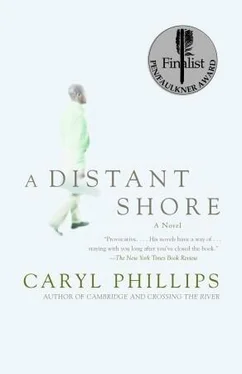Never before had I left the capital. As we passed through the shanty towns which clung to the edges of our main city, I stared in disbelief at the corrugated tin shelters which sprouted out of what looked like foul rubbish dumps. Although I had not seen these places with my own eyes, such tin-roofed slums, where beggars patrolled the streets, were widely known to be home for the disabled and maimed, places where huge rats bred freely and roamed by day and by night. I continued to stare in disbelief. This was our city? We soon passed into the countryside and sped south along the narrow strip of asphalt that had been laid clumsily over loose earth. The frayed edges of the asphalt had already been chewed by the red soil, and it was clear that at some point in the near future this “road” would disappear. I looked to either side, but there was nothing except a dark curtain of bush.
The truck rolled and swayed like a drunk, and as we pressed further south we began to pass hundreds of displaced persons walking towards us with mattresses, cooking pots, and bundles of possessions on their heads. We soon grew accustomed to the barricades of burning tyres that occasionally blocked the road, and finally one of our escorts climbed wearily to his feet. He steadied himself by holding on to the side of the truck, and we stared at him as he stood before us resplendent in his grimy New York Jets T-shirt with his belt of neat bullets, like long chocolate fingers, that was wrapped around his waist and across his chest. He was chewing some kind of nut and the juice was dribbling down his chin, but either he did not care or he did not notice, for he made no attempt to dam the black rivulet at the corner of his mouth. He looked through his gold-rimmed glasses at all five of us in turn, and then he began to speak without enthusiasm, as though his words carried no weight.
“We are fighting for a purpose. Our aim is to liberate our land from these unscrupulous men who hate us. They outnumber us two or three to one, but they are mosquitoes. They suck our blood, but you will be trained so that you can squash them, do you understand?”
We looked at this man and nodded, and he stared at each one of us in turn and then, as though suddenly overcome with fatigue, he carefully lowered himself to the floor of the truck and once again rolled over and onto his side and closed his eyes. I watched him, for I was sure that this was some trick of his to test us, but soon I was convinced that the man had truly fallen asleep and the rest of our journey passed in silence.
In the south we were held in the bush far away from the nearest village. Those who trained us were boys, but they walked with the authority of old men in their plastic flip-flops. Their painted nails, and the teddy bears that many clung to, initially caused me to be confused. I soon learned that the currency of the camp was weed that you smoked, and this gave these soldiers a feeling of invincibility so that holding a stuffed toy, or wearing a Donald Duck mask, or daubing oneself with bright-pink lipstick, could never undermine their manhood. For my own part, beyond the dark sunglasses which we all craved and needed, I decided not to decorate myself, and perhaps because of my conservative bearing, and the fact that I was some ten years older than most of the men, I was chosen to be the leader of a brigade. I was different, for I had more education than the others, and more ambition to make something of myself in the world, and for these reasons they listened to me whenever I chose to speak. However, I was not a man to waste words, and most of the time I remained silent, which is why they took it upon themselves to christen me “Hawk.”
Our first raids were a great success. I would lead the men into a village and we would drive out the government troops. We discovered many villagers with swollen stumps where their arms and legs used to be, the skin stretched and sewn together with makeshift stitching. These men had been tortured by the government troops, and many of our own people had now begun to resort to the same tactics in order to extract information, but I refused to allow my men to hack off limbs. When we had either killed or captured our enemy, the grateful villagers would re-emerge and shout and cheer for Hawk and his men. We showed restraint and, rather than just taking, we always waited for the liberated villagers to reward us. Sometimes they would cook food for us, rice with spicy sauce, cassava-bread pancakes, fresh roasted yam or soup; what little they had they would share with us, and even those who were not of our tribe knew that we would treat them better than the government soldiers. They knew that we were fair men, and when we left, my men always carried new gifts: a shower cap, a wedding headdress or a pair of women’s shoes. Patrick, my second-in-command, enjoyed smearing his face in mud and he took to wearing a wig with one long braided pigtail. Never without the weed, Patrick soon appropriated the name “Captain JuJu” and shortly after his rebirth he would not answer to any other title.
“Patrick,” I would ask him, “what juju are you using?” and he would laugh as though my question was the opening gambit in a game. Patrick would cackle and pass me the joint.
“Hawk, you are a funny man.” And then Captain JuJu, who had long forgotten that my name was Gabriel, would flap his arms and begin to run around and screech, “Only Hawk can fly” while the rest of the men clutched their sides with laughter. “Only Hawk can fly.” And I would take the weed and watch crazy Patrick with a quiet smile on my face. “Only Hawk can fly.”
For over a year this was our life, moving stealthily from one village to the next, driving back the government troops and waiting for news from the rest of the country, or a message from our leader back at the training camp. His headquarters was a small tin-roofed hut that was circled by bodyguards, and there he would sit with only his satellite telephone for company and plan the liberation campaign. Approximately once every month, our leader would call his commanders to him, and at such times a jeep would arrive and I would travel back south, leaving the troops in Patrick’s charge.
Colonel Bloodshed never removed his Ray-Ban glasses or his Nike training shoes. Inside his hut he had glossy photographs of American film actresses stuck to the wall, and while I waited for him to look up at me, or finish a telephone call, I would stare at the fading pictures and wonder why these girls in particular? The miracle of electric light was produced by the roar of the leader’s private generator, but above the noise of the engine I could still sometimes hear the sound of screaming as sand was being pushed into the ears of government soldiers, or I would hear cries for mercy as fresh captives were being hung upside down over the septic tank. Colonel Bloodshed seldom killed prisoners, this much I knew. Fear was enough to make the enemy talk, but I disliked hearing the noise. When the leader spoke to me from behind his glasses he enjoyed calling me Hawk, and he loved speaking in riddles and telling me that there were no more devils downstairs in hell, for they were all up here on earth visiting our country. He loved reminding me that guns must liberate, but they must never rule.
“Major Hawk,” he would say, “you are one of my ten chiefs. Remember, in war there are casualties, and we all do things that we wish we had not done.” Our leader would pause. “But remember. Guns must never rule, and I say this as a soldier.” Again he would pause, and then he would lift up his eyes as though trying to peer at me over the top of his Ray-Bans. “Hawk,” he would whisper. “To not be buried in one’s own land. Now that is the ultimate insult. You understand, don’t you?”
I would nod, but Colonel Bloodshed never listened to me, and I assumed he never listened to any of his “chiefs.”
Читать дальше











![Карен Кингсбери - A Distant Shore [calibre]](/books/384306/karen-kingsberi-a-distant-shore-calibre-thumb.webp)
